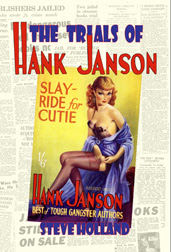"Will shock those who regard drug-addiction as something that affects other countries, not our own," said Kenneth Robinson, M.P. "Should be compulsory reading for every doctor and politician who opposed the ban on heroin."
Raymond Vincent Thorp was born in Thornton Heath, Surrey, on 29 September 1930, the son of Alfred Henry Thorp (1882-1953), a house decorator, and Beatrice Alice Stacey (1884-1961), married in 1904, who went on to have six children. Thorp, the youngest of the six, later described his childhood as "Drab, colourless, dismal, best forgotten." His father, who, by the 1930s, ran a tiny building business, died while Thorp was jailed in Brixton.
Educated—thanks to a scholarship—at a grammar school in South London, he left at 16 to enter an office in Kingsway where he was promoted after a year to Junior Export Clerk. A growing interest in swing music and jazz took him to clubs along Oxford Street and in Soho where he started smoking "charge". He soon became a dealer in half crown bags of marijuana and was soon in court, pleading guilty on 10 September 1951; a week later he was released into the custody of his sister (his father was, at the time, hospitalised due to complications arising from an earlier fall that had caused a split skull).
Soon after, he began dealing in cocaine, was almost sacked from work for smoking hemp, and moved into a bedsit in Bayswater; he moved permanently into a flat the West End in the spring of 1952, from where he dealt hash, hemp and heroin. Thorp was arrested and charged with possession of cocaine, entering a guilty plea when he was charged a week later and sentenced to six months.
Released in November 1953, he moved into a bed-sit in W2, where he started dealing again, and later moved to the East End in Cable Street and then Rowton House, all the time pushing hash but earning very little. Whilst renting rooms in Camden Town and Kentish Town he was on National Assistance, which barely covered his rent; he added to it by conning kids with phoney drugs. He was arrested for petty larceny in June 1954 and sentenced at Clerkenwell to four months at Pentonville. He was released on 21 August 1954.
After a few month odd-jobbing in Oxford and London, Thorp sold his story to Reynolds News, where he featured on Sunday, 28 November 1954. Derek Agnew, a newspaper journalist, records in Viper that he met Thorp in a rundown flat in Piccadilly in the summer of 1955 and worked with him for some months on the book, which he (Agnew) wrote an introduction and afterword, and almost certainly ghosted the rest.
Viper was published by Robert Hale in 1956.
What became of him after that, I have no idea. A couple of phone book entries list him as living in Bayswater in the early 1980s. He was living at 6 Effra Court, Brixton Hill, London SW2 when he died on 12 September 1990.
Saturday, September 10, 2016
Subscribe to:
Post Comments (Atom)


























































No comments:
Post a Comment